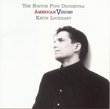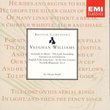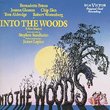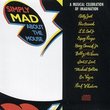| All Artists: Louis Spohr, Johannes Wildner, Slovak Radio Symphony Orchestra Bratislava, Slovak Radio Symphony Orchestra (Bratislava) Title: Spohr: Clarinet Concertos Nos. 2 and 4; Fantasia and Variations, Op. 81 Members Wishing: 0 Total Copies: 0 Label: Naxos Original Release Date: 1/1/1995 Re-Release Date: 3/21/1995 Genre: Classical Styles: Chamber Music, Forms & Genres, Concertos, Historical Periods, Classical (c.1770-1830), Instruments, Reeds & Winds Number of Discs: 1 SwapaCD Credits: 1 UPC: 730099568920 |
Search - Louis Spohr, Johannes Wildner, Slovak Radio Symphony Orchestra Bratislava :: Spohr: Clarinet Concertos Nos. 2 and 4; Fantasia and Variations, Op. 81
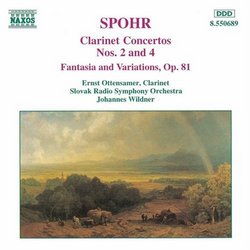 | Louis Spohr, Johannes Wildner, Slovak Radio Symphony Orchestra Bratislava Spohr: Clarinet Concertos Nos. 2 and 4; Fantasia and Variations, Op. 81 Genre: Classical
|
Larger Image |
CD DetailsSimilarly Requested CDs
|
CD ReviewsGood material played badly G. Capuzzo | NC | 06/28/2002 (2 out of 5 stars) "The works by Louis Spohr featured on this recording are not standard works for clarinet, which is very refreshing. One can only hear the Mozart Concerto so many times before wondering if anyone else composed anything of note. These works are quite interesting and fun to hear as well as to play. However, the performance is mediocre at best. When listening to the recording, one begins to wonder where one measure ends and the next begins. Even with a score, it is difficult to find any semblance of a steady beat. The expressive quality of the playing is also somewhat lacking, partially because the technical aspects (including tempo) are quite weak. While this recording offers the opportunity to become aquainted with different material for the clarinet, it does not provide a good representation of the true musical quality of the pieces." You Needn't Play the Clarinet Yourself ... Giordano Bruno | Wherever I am, I am. | 10/10/2009 (4 out of 5 stars) " ... to relish the moody beauty of the clarinet's timbre or to appreciate the splendid concertos that co-evolved with the instrument in the late 18th and early 19th Centuries. The key names to 'search' are Stamitz, Krmmer, Mozart, Spohr, and Weber; their works for clarinet - in concertos, quintets, divertimentos, and even operas - are the core of the clarinetist's repertoire. The clarinet gets its name from the clarino register of the trumpet, but the earlier single-reed 'chalumeau' got its name from the double-reed shawm (Schalmei in German). The proto-chalumeau of the 16th Century -- this is conjecture, mind you -- emerged from somewhere east of Hapsburg Austria. It was an instrument of limited range, about an octave plus one or two notes, very comparable to the capped-reed Krummhorns that were quite popular in Hapsburgia in the era of Isaac and Stoltzer. My guess is that it was played by the same people who played recorders and other winds with finger holes. The Krummhorn could never be 'overblown' to a higher octave as the recorder and cornetto could be, by using a thumb hole or thumb key. In fact, counterintuitively, when you overblow the chalumeau, you jump several notes rather than step up to a second octave. Thus -- again conjecturally -- the chalumeau followed the same path of development as the Krummhorn, toward a lower register by the use of right-hand keys. That would explain why the bassett-horn form of clarinet reached concert-worthiness before the five-key classical-era clarinet. Mozart's sublime clarinet quintet and concerto were both written for bassett instruments. Louis Spohr (1784-1859) was a violinist of considerable reputation but a composer who was widely perceived as 'old-fashioned' in his own time. He was a reluctantly well-traveled sort of musician, bouncing from Russia to Italy to London and finally to Kassel, in what is now Germany, where he stayed for 35 years. The first of his clarinet concertos was composed in 1808, on commission, to be performed by clarinetist Johann Simon Hermstedt. Spohr claimed to have no prior experience with the clarinet, so it's quite likely that he worked closely with Hermstedt. In any case, all of Spohr's subsequent pieces for clarinet were also composed for performance by Hermstedt. Spohr's first effort involved passages that couldn't be well played on any existing clarinet, so Hermstedt either modified or secured modification of his instrument, meaning that Spohr's demands contributed to the evolution of the 'romantic' clarinet for which Weber was later to compose. I have to disagree with previous reviewers about this recording of Spohr's clarinet music. I find the music itself first class but the performance rather lackluster. It's impossible to doubt that Spohr was aware of Mozart's clarinet compositions, and perhaps of Stamitz's also; the echoes are too obvious, especially in the adagio movements. Spohr's frolicking allegros and moonlit adagios, to my ears, do stand up to comparison with Mozart's. The performance recorded here, by the Slovak State Philharmonic, is solidly 'classical' in style and proficient technically, but the clarinetist, Ernst Ottensamer, doesn't excite me much. His fingering and articulations are excellent but his upper register is thin -- flutey, almost mosquito-ish -- enough so that his octaves tend to sound narrow. The CD is still enjoyable listening but I expect that I'll find myself looking for a replacement performance before long." Well played, not a classic Giordano Bruno | 09/22/1999 (3 out of 5 stars) "The recording is clear and spacious, with the clarinet well placed in the overall aural pictures. Ottensamer plays impressively well whilst not conveying the full emotional impact of Spohr's work. The pieces themselves are well constructed with mellow adagios and lively conclusions. Wildner directs the Slovakian orchestras with purpose and the players respond to this. Not sure why, but it still does not move me overly. Perhaps they are not great concerto works."
|

 Track Listings (7) - Disc #1
Track Listings (7) - Disc #1